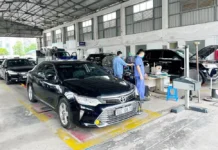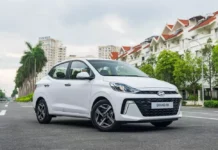Charging Stations: A Crucial Factor in Real Estate Projects
Empty Apartments without Charging Stations
The Los Angeles Times recently analyzed the importance of electric charging stations in apartment and office projects. They shared the story of a $350 million apartment building in downtown Los Angeles, USA. Prior to construction, the project director, Hamid Behdad, had to compromise with the planning committee. To fulfill their last-minute demand, the number of electric charging stations at the apartment tower had to be quadrupled. Although Behdad initially believed the requirement was excessive, he now acknowledges that it was a crucial decision.
Electric charging stations have become a vital amenity at high-end apartment buildings like The Kensington in Boston, Massachusetts, USA. Photo: Gustav Hoiland
Completing the Broadway tower and attracting buyers, Behdad expressed his satisfaction with the planning committee’s decision. Without the 90 charging stations installed at over 20% of the parking spaces, selling apartments would have been considerably challenging. In many U.S. cities, apartment projects without sufficient charging stations face difficulties in attracting and retaining buyers, risking high vacancy rates.
Jackie Impellitier, ZRS Management’s Deputy CEO, revealed that their property management company, managing 76,000 apartments, is urgently installing level 2 electric chargers in garage areas. These paid charging stations provide a full charge to electric vehicles within 3-8 hours. The charging cost will be added to the tenant’s electricity bill.
“Charging stations are no longer an amenity but a necessity to attract and retain tenants. Without easy and convenient charging services, we will gradually lose tenants,” admitted Mrs. Jackie Impellitier.
In 2021, the prices of homes equipped with electric chargers in the Greater Toronto area, Canada, increased by more than 19% compared to 2020. Photo: Properly.ca
Times have changed rapidly. Jackie Impellitier explained that five years ago, most property developers and apartment owners did not consider electric vehicle users as potential renters due to the limited availability of electric vehicle models. However, as virtually all global car manufacturers have produced electric vehicles, the situation has significantly shifted.
A similar trend is occurring in many cities worldwide. In the Toronto and Vancouver areas of Canada, statistics show that an increasing number of users are looking to buy real estate with electric vehicle charging stations. Sales of apartments equipped with charging stations in these areas experienced an annual growth rate of 15%-16% from 2020 to 2021.
Charging Stations in Office and Commercial Real Estate
In addition to residential projects, electric vehicle charging stations in office and commercial real estate projects are also crucial for development. More businesses are incorporating electric vehicles into their operations, making the availability of charging infrastructure a determining factor for choosing business locations and branches.
In order to retain customers, renowned retailers in the U.S. are rushing to install charging infrastructure to serve the growing number of electric vehicle users. Photo: The New York Post
According to a survey by ChargePoint, 90% of property managers consider access to electric charging infrastructure an important criterion when evaluating potential business locations.
Notably, brands and labels see charging stations as an attractive feature when it comes to attracting customers. For example, retail giant 7-Eleven announced plans to build the largest-scale fast-charging network on the market.
Several major U.S. retail companies have also joined the race. The Walgreens pharmacy chain has installed charging systems in over 430 locations. Other renowned retailers, including Ikea, Kohl’s, Walmart, Starbucks, Whole Foods, Taco Bell, and the Cinemark cinema chain, are rushing to install charging infrastructure.
Even the infamous Subway sandwich chain plans to build “battery charging parks,” combining restaurants, charging stations, playgrounds, and green spaces. These parks will be established in Subway’s new business locations across the U.S.
The inevitable rise of electric vehicles is driving various industries, from real estate to retail, to adapt and embrace change. Installing electric vehicle charging stations in apartment and commercial projects has become mandatory in many countries. This direction not only meets the practical needs of users but also contributes to promoting green transportation worldwide.
PV (Tuoitrethudo)
According to Los Angeles Times, Energy5
VinFast Charging Station Achieves 3.5 km/station Density in 80 Cities Nationwide
VinFast’s charging station network has expanded significantly in major cities and central areas, providing coverage in all 63 provinces and on 106 national highways. With a dense density of charging stations only 3.5 km apart in 80 out of 85 cities nationwide, VinFast is ensuring convenient access to charging for electric vehicle owners.

































![[Quick Review] Hyundai IONIQ 5 – A Vehicle from the Future](https://vnauto.net/wp-content/uploads/2023/10/xehay-hyundaiioniq5-18052022-2-150x150.jpg)














